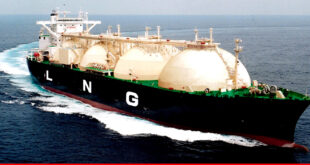Corporation has world’s youngest fleet of quality vessels
India, Sri Lanka, Bangladesh and multinational companies charter its vessels
Despite ECC decision, public sector organizations reluctant to utilize PNSC services
Pakistan can save huge cost being paid to foreign flag-ships
Interview with Brig. (Retd) Rashid Siddiqui – Executive Director PNSC (Administration) and former chairman PNSC
Profile
Brig. (Retd) Rashid Siddiqui is the Executive Director (Administration), Pakistan National Shipping Corporation, and the former chairman of the same corporation.
He is a recipient of Sitara-e-Imtiaz (Military), SI (M).
Brig. (Retd) Rashid Siddiqui SI (M) joined Pakistan National Shipping Corporation in 2002 as Executive Director (Administration). During this period he provided and developed policy guideline on HR, Security, Administration, Real Estate, Protocol and Crises Management.
He also participated in purchase and sale of vessels and Fleet Development. As Chairman Provident Fund, he is responsible for its accounting investment and Asset Management.
He was appointed Chairman/CEO and Chairman Board of Directors of Pakistan National Shipping Corporation in November 2009 till March 21, 2011. During this period, he developed five-year fleet development plan which included replacement of vessels in Phase-I and expansion of Fleet in Phase-II. During this period he arranged loan without GOP guarantee and added six modern vessels to the fleet.
He joined Pakistan Army in September 1971 and remained so till 2002. He is a graduate of Command and Staff College and National Defense College. During his Army career he has been Member Faculty National Defense College, Islamabad (Most prestigious Institution of Pakistan).
A citadel of training senior officers of Armed forces and Civil Services of Grade-20 and above of Pakistan and friendly countries. As Director Military Intelligence he was responsible to collect, collate and interpret information, preparing reports and intelligence summaries for the Army Chief. As Brigade Commander he was responsible for planning and issuing operational training and administration policies for 5000/6000 officers and men.
He has attended seminars and symposiums both at national and international level on Security, Human Resource Development, Analysis of Financial Statement, Poverty Alleviation Challenges, Asia Pacific security in China.
PNSC is a national institution comprised of a fleet of 9 vessels including five bulk cargo carriers and four oil tankers. In fact PNSC’s fleet of vessels is one of the youngest fleet in the maritime business, which was replaced in 2010 when I was the Chairman of PNSC.
PNSC has gradually replaced all the aged vessels of 25-26 years with younger vessels of 6-7 years of age with a view to enhance efficiency of the fleet.
Although having the youngest and efficient vessels in its fleet PNSC, which is offering quality services, is attractive for international companies chartering its vessels and countries like Sri Lanka, Bangladesh and India are using it for transportation of oil, it is unfortunate the public sector organizations are reluctant to utilize PNSC services for their import of cargos may be because of doubly audited financial system, which discourages any false play in finance.
Brig. (Retd) Rashid Siddiqui while giving an overview of PNSC in an interview said that PNSC has become one of the youngest fleets in the world with an average age of 10 years of each vessel.
For improving quality of the ships we decided to go for Japanese built ships of fewer than seven years of age, the reason for buying Japanese ships was the quality of ships, which was the best in the world and another reason was to standardize the fleet in terms of spares and inventory.
Had we acquired 9 ships of different made and countries we would have to maintain an inventory of different spares parts, which naturally cost us too much.
The new ships were efficient which saved us from maintenance expenditures; they are fuel efficient and also helped increasing number of voyages. These new ships also resulted in increased acceptability at every port due to easy deployment so it helped to enhance range of operation for PNSC.
PAGE: Would you like to share the role of PNSC in transporting oil for the refineries and other oil business in Pakistan.
Rashid Siddiqui: Earlier we were carrying oil for refineries for PARCO, PRL & NRL. PARCO is an Abu Dhabi based company and the Government of Pakistan has a share in this company while PRL and NRL both are our clients and we had a fresh five-year contract with both of the refineries.
We also tried to tap the oil transportation business of Pakistan State Oil (PSO) which was using foreign flag ships, which means outflow of hard earned foreign exchange while working with PNSC the foreign exchange, we tried to convince PSO to use national carriers for transportation of oil but they were already in contract with other suppliers.
However we did not give up the idea and have a deal with their suppliers including Bakray and Kuwait for one year then again we approached PSO with the solid reasons that we are now working for their suppliers and it would be in the national interest to utilize national carriers to save the foreign exchange
They were reluctant to make changes in the existing arrangement, then we floated the idea that we at PNSC may buy a ship as a joint venture, which can be used for shipments of crude as well as white oil for them this idea was clicked and after signing MoU agreement we started working jointly for the last four years, which helped the government saving a lot of foreign exchange.
Actually the maritime business passing through a slowdown all over the world and one ship, which used to earn $25000 in 2008 has come down to $5000-6000 while price of the ships has also come down due to global slowdown in the shipping industry.
However, some quarters were not happy with this arrangement and even they went to court by raising lame excuses that proper tender was not floated etc.
However the High court and even the Supreme Court issued a stay order in our favor and we are doing business for PSO under that stay order.
Some quarters opposing utility of the national carriers despite the fact that this arrangement was approved by the ECC. It is practiced all over the world that the government protects their national flag carriers, even US provides protection to their national flag carriers.
As a result of opposition put up by some quarters on the pretext of quality of the oil, PSO has withdrawn white oil and high sulfur oil transportation from the contract.
Although we tried to convince them that we are neither producer nor supplier we are offering transportation services, which has nothing to do with quality of the oil yet they have their own reasons and interest and now the business with PSO has come down to merely 25 percent with PNSC, which has direct impact on our foreign exchange reserves.
It may be interested to note that PSO had a profit of $22 million while working with PNSC.
PAGE: In the backdrop of the story you have narrated can we say there is a lack of coordination and cooperation among the public sector organizations?
Rashid Siddiqui: With a pause, to some extent you are right and the lack of coordination exists at least at ministerial level. Now after acquiring new vessels, the PNSC now in a position to cater to all the international requirements, we worked for Sri Lanka, Bangladesh and even India for transportation of oil for them.
Shell also charter our ships while Kuwait Petroleum also used our ships for one year. All these international companies are willing to work with PNSC only because we have the quality ships and meet all international requirements and standards.
PAGE: What is the financial status of PNSC is it in profit or break even or financially deficit-company?
Rashid Siddiqui: It is a matter of interest that since 2000 we are on positive side and in a sound financial health in 2012 after profit was Rs400 million after tax and now in 2015-16 after earnings are ranging Rs1.5-2 billion after tax.
We are now a self-generating entity, we neither taken any subsidy or sovereign guarantee from the government. In fact since 2000 we are self-reliant and self-generating company and not a burden on the government or the national economy. Our turnover is between Rs18 to Rs20 billion. At the moment our earning per share is around 13 percent.
PAGE: What is the share of PNS in cargo business in Pakistan?
Rashid Siddiqui: Although there is a clear directive from ECC that public sector organization should utilize services of PNSC yet the response is not so encouraging, apart from oil transportation in dry cargo we are offering services for Armed Forces, Pakistan Railways and WAPDA also worked with us but with some reservation, Sui Northern is also working with us reluctantly because they had tried to create some problems but the Sindh High Court gave the ruling that both are public sector organizations and they should work for the interest of the country, now we are endeavoring to get the business from Trading Corporation of Pakistan, which imports different commodities worth over $1 billion.
PAGE: Under the CPEC program Pakistan has to import huge machinery and other accessories especially for coal power plants, will PNSC play a role in this huge project for transportation of plants etc?
Rashid Siddiqui: Yes you are right, we have tried to contact the authorities responsible for developing coal power plants, which will generate huge transportation business yet so far they are not responding in a positive way because despite having our representation in their board of directors they are not inviting us in meetings or discussing their future plan for import of machinery for coal power plants.
 PAGE Blog Business Weekly Magazine
PAGE Blog Business Weekly Magazine

